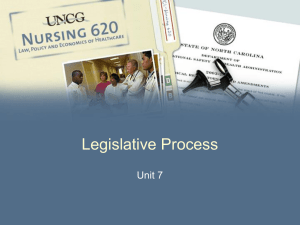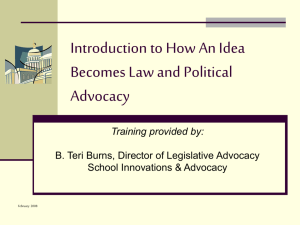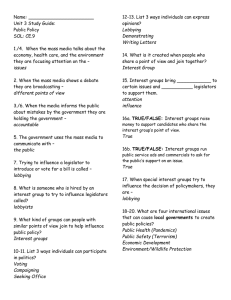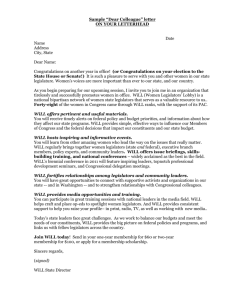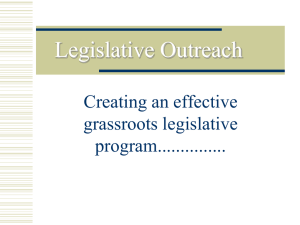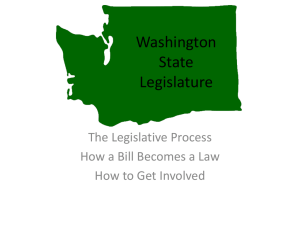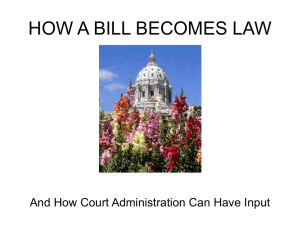Making Contact with Legislators
advertisement
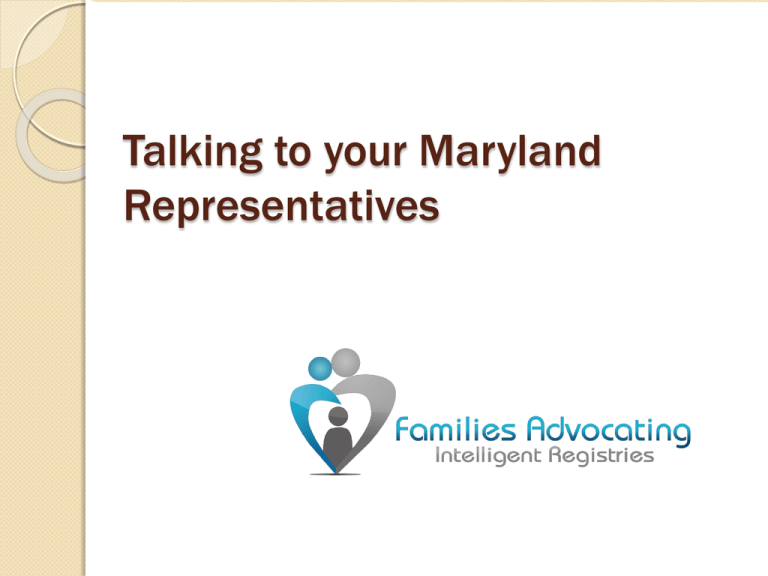
Talking to your Maryland Representatives Talking to your Maryland Representatives The Legislative Process Making Contact with Legislators Committee Hearings THE LEGISLATIVE PROCESS The Legislative Process - 1 Legislation is introduced and works through both sides of the Legislature to potentially become law. A Senate Bill or House Bill is introduced. Time to send letters. If a House Bill, it will first be heard in the appropriate House Committee; likewise for a Senate Bill Bills that both sides agree on go before the Governor to be signed into law. Public hearings are held. NOW is the time to Be HEARD! Bills that are passed move on to the other side of the Legislature. The process repeats. The Legislative Process - 2 Committees: Focus on a particular type of legislation. (Ours are usually judicial.) Meet weekly during Session to consider proposed new laws. Recommend to the entire General Assembly which proposed laws should pass or fail. Gather input from the public to help inform their decisions. The Legislative Process - 3 Each legislator is appointed to serve on one principal standing committee. The Senate Judicial Proceedings Committee is located in the Miller Senate Building. The House Judiciary Committee is in the Lowe House Office Building. Links to current bills related to our cause are posted on the FAIR Groupsite. MAKING CONTACT WITH LEGISLATORS Rules of the Road Writing Letters Making Phone Calls In-Person Meetings Ineffective Techniques Making Contact with Legislators - 1 Meeting legislators one-on-one is the best way to get your message across. During General Assembly you are better off ◦ ◦ ◦ ◦ visiting their office, calling, faxing or mailing your appeal. At least then you will make contact with their staff. Making Contact with Legislators - 2 Maryland legislators give their own constituents priority. ◦ If your elected official is on the judicial committee, it is critical to contact them when the bill is in committee. ◦ If they are not on the committee, contact your elected official, stress the urgency of your concerns, and encourage them to vote “your way” when the bill reaches the floor. Making Contact with Legislators - 3 Saying you are part of a citizens' group lends credibility to your stance. However, please ONLY do this if you are presenting the FAIR message to prevent unintended negative consequences. Rules of the Road - For ANY Contact with Legislators or Staff State your name and where you are from (town/county). Purpose of your call (oppose/support a bill, discuss a particular concern), and Rules of the Road - For ANY Contact with Legislators or Staff - 2 DO NOT focus on yourself and your hardships. ◦ Point out how your situation is identical to over 7000 others in Maryland, and you are there representing ALL of them, their friends, and their families who are affected by these laws. ◦ No stories about how you or a loved one got a bum deal in the justice system. ◦ The legislator must try to balance the wishes of many different constituents, and he or she needs to know this issue affects many, many people. Rules of the Road - For ANY Contact with Legislators or Staff - 3 ◦ Keep your comments very brief and to the point. ◦ No ranting about bad government or other political issues ◦ Have in your hand a bulleted list of the key points you want to make. Be polite and professional. Thank them for their time, regardless of the outcome. Responding to Questions Try to anticipate what questions the legislator may ask. ◦ Do your best to provide brief, straightforward answers to questions. ◦ If you don't know an answer, say so. Then, if possible, find the answer and relay it later. ◦ The FAIR Public Brochure and “Things You Should Know” sheet are very helpful. Responding to Questions - 2 Personal questions will be asked. ◦ Registrants and family members do NOT have to identify themselves as such. Focus on the issues – especially in public testimony. ◦ If your (or a loved-one’s) case is very sympathetic (and false accusations do not count as sympathetic here) you might choose to briefly answer these. Otherwise, divert the questioner back to the issue at hand. Phone Calls Use the same talking points for phone calls. If you call during General Assembly, you may only have time to give your name, address, bill number, and a couple of sentences saying why you are for or against it. If you have more to say, arrange a time to talk by phone or in person to the legislator or his/her aide. Writing Letters When bills of interest surface, FAIR will provide key points to present to your legislator. It is important that your letters are personal and unique. Form letters do not work. Postal mail or fax letters to all members of the appropriate committees. Use e-mail only if you already know and communicate with your reps via email. Ineffective Techniques Threatening not to vote for a legislator in the next election. Over-focusing on emotional aspects. Over-focusing on statistical data and showing no emotion at all. Exaggerating and guessing. If no reliable data can be found, say so and why. Being confrontational and argumentative. Being long-winded or rambling, even if it’s a highly intelligent ramble. COMMITTEE HEARINGS Getting Ready to Testify Delivering the Testimony Committee Hearings – Getting Ready at least thirty minutes early. ◦ This will give you the chance to sign the witness sheet and become comfortable with you surroundings. ◦ If you want to distribute a copy of your testimony, turn that in at the same time. Follow the same rules we give for writing a letter. Committee Hearings – Getting Ready Showing up at a hearing and planning to just “wing it” is a very bad idea. ◦ It is much better to have a firm three-minute speech rehearsed, and make a few last-minute tweaks as needed. ◦ It is just too easy to lose focus or say something counterproductive. Don't be intimidated. Maryland’s General Assembly is a citizen legislature. Legislators want to hear what you have to say. Delivering the Testimony - 1 the same rules outlined for meetings and letters. Usually, the Chair will call a bill's sponsor first, followed by proponents and opponents who have asked to testify. Delivering the Testimony - 2 Try not to repeat testimony offered by previous witnesses. Refrain from asking questions of committee members. Public hearings are for us to provide information on the legislation under consideration. Delivering the Testimony - 3 Show mutual respect. Your views are important, but there are many sides to every issue. Don’t be offended if committee members come and go during a hearing. Other meetings are often running simultaneously. LEGISLATION TAKES TIME, AND PERSISTENCE PAYS OFF.
